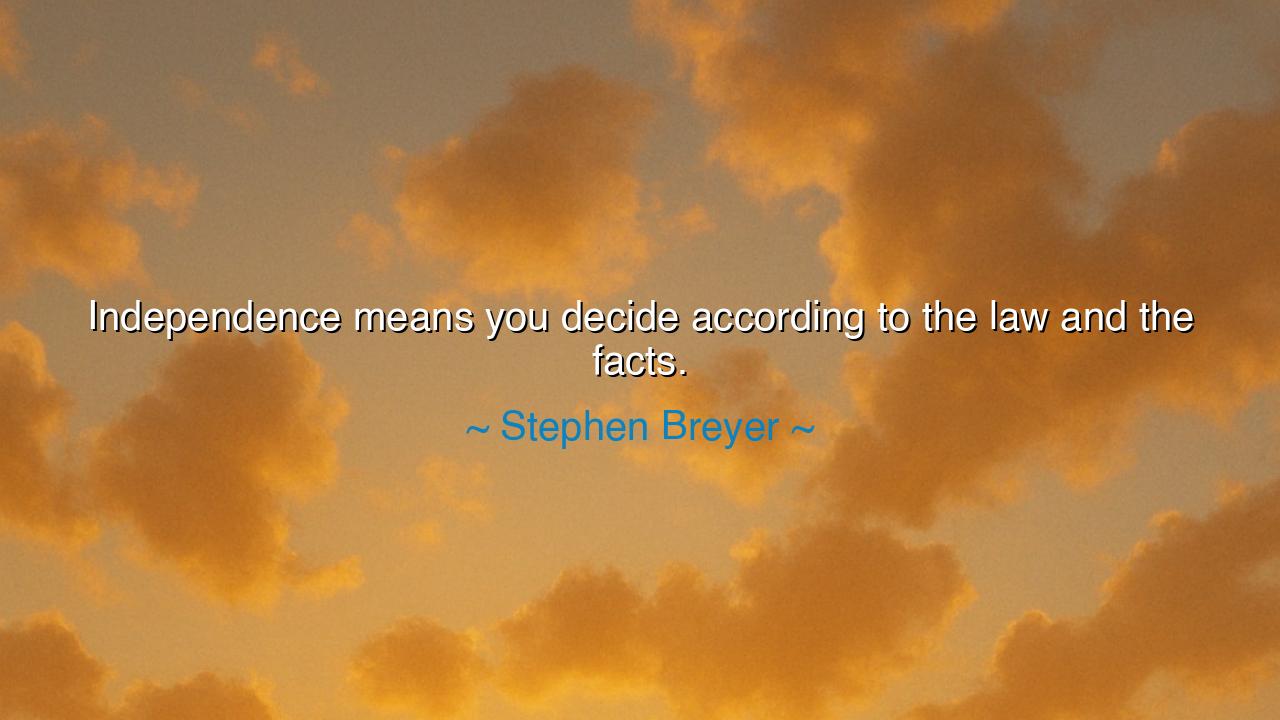
Independence means you decide according to the law and the facts.






When Justice Stephen Breyer declared, “Independence means you decide according to the law and the facts,” he spoke not only as a jurist of reason, but as a guardian of one of civilization’s most sacred trusts—the independence of judgment. His words shine as a guiding flame for all who hold authority, reminding them that true independence is not the freedom to do as one pleases, but the discipline to do what is right. To be independent, in Breyer’s sense, is to stand unmoved by the winds of passion, politics, or popularity; to hold fast to the pillars of law and truth, even when the world clamors for something easier, swifter, or more pleasing to the crowd.
The origin of this quote lies in Breyer’s long service as a Justice of the United States Supreme Court—a court designed to be independent of kings, presidents, and public opinion alike. In the tradition of the ancient philosophers and the framers of the Constitution, Breyer saw the law as a covenant between reason and conscience. His words were a reflection of his judicial philosophy: that the sacred duty of a judge is not to serve power, but principle. For in every age, there arises the temptation for those in authority to bend truth to desire, to trade justice for favor. Breyer warns us that independence is not rebellion—it is fidelity: fidelity to the facts as they are, and to the law as it is written.
To decide “according to the law and the facts” is no easy task, for it requires the soul to be steadfast amid storms of emotion. The truly independent mind does not flee from truth, even when truth offends. It listens to both sides with equal care, seeks the evidence with clean hands, and renders judgment without fear or favor. Such independence is not loud or defiant, but quiet and resolute—the courage to stand in stillness when the world roars with prejudice. Breyer’s words thus call upon us all to practice a deeper kind of freedom: the freedom from bias, the freedom from ignorance, the freedom from self-interest.
History has shown us the greatness—and the cost—of such independence. Consider the story of Sir Thomas More, the English statesman who served under King Henry VIII. When the king demanded approval for his unlawful marriage, More refused, saying he could not betray law or conscience. Though he loved his country and served his king, he could not call falsehood truth. For that refusal, he was condemned to death. Yet in his final moments, he proclaimed, “I die the King’s good servant, but God’s first.” More’s faithfulness to truth over favor, to law over power, stands as a timeless example of Breyer’s ideal—independence that serves justice, not self.
The ancients, too, revered this kind of steadfastness. In the courts of Athens, Socrates faced the wrath of the people for questioning their hypocrisy. He might have saved himself with flattery or deceit, but he chose to obey his conscience, to stand by the facts of reason as he saw them. When condemned, he drank the hemlock calmly, saying that no evil could come to a good man who speaks truth. From Socrates to Breyer, from the marble courts of Greece to the chambers of modern justice, the message endures: independence of thought is the foundation of all righteousness.
Breyer’s quote reaches beyond the courtroom. It is a lesson for all who must make choices in life. Whether one governs a nation or a household, whether one commands armies or simply his own conduct, the measure of independence lies in obedience to truth. The world is full of noise—flattery, pressure, fear—but the independent soul listens only to what is just. When one acts not from impulse or influence, but from clear knowledge and honest reasoning, one stands among the truly free. For truth, once known and obeyed, liberates more deeply than power ever could.
Therefore, let this teaching be engraved upon the hearts of those who seek wisdom: independence is not the absence of authority—it is loyalty to truth above all authority. Seek the facts before speaking; understand the law before judging; and hold to principle even when it costs you comfort. In family, in work, in nation—decide according to what is right, not what is easy. And when others waver, be as the judge who stands firm upon the rock of justice, saying, “Here I will remain, until the law and the truth themselves command me otherwise.”
So, my children of this age, remember the wisdom of Stephen Breyer: “Independence means you decide according to the law and the facts.” For only those who root their actions in truth can claim to be free. The rest are slaves to vanity and fear. Let your mind be disciplined, your conscience clear, your reason pure. For independence, when guided by truth, is not merely a virtue—it is the light by which civilization endures.






AAdministratorAdministrator
Welcome, honored guests. Please leave a comment, we will respond soon